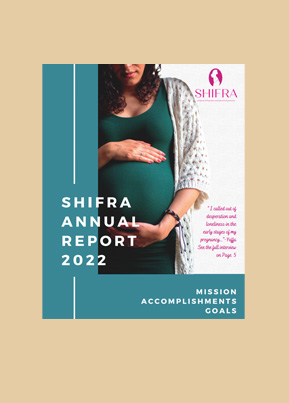Vulnerable pregnant Jewish women need more than rhetoric.
“I don’t feel comfortable with abortion at all,” Dara*, who was nine weeks pregnant, told me explicitly in our first conversation.
I was the on-call volunteer for In Shifra’s Arms (ISA), and the situation sounded straightforward to me. At the time Dara called, the newly formed ISA was assisting around a dozen women around the country who wanted support in order to continue their pregnancies.
I told Dara that she didn’t have to abort if she didn’t want to. I offered her help in finding better employment and new job certifications so she could support her baby. I also shared information about how many Jewish families yearn to adopt. If she wasn’t ready to be a mom, I offered to connect her with a partner adoption agency.
What happened next shocked me because of the magnitude of the manipulation and abuse Dara was forced to endure. Dara’s ex, Joel, had gotten her pregnant and kept insisting she should abort. He justified his position by saying Jewish law prioritizes the mother’s mental health over that of the fetus.
When Dara informed Joel that she would prefer adoption, it quickly became apparent that Joel was concerned about his desires, not her needs. Joel threatened to make Dara’s life hell if she kept the baby, insisting that she would be ruining his own life and his chances of marrying someone else. He asserted he would never sign adoption papers because adoption would make him a bad father.
Abortion was not Dara’s first choice, but it felt like her only choice. She’s not alone.
Every person’s mental health, emotional wellness, and stability are intimately tied to their support network. When the support isn’t there, the toll it takes is devastating. Joel claimed that Dara should abort for her the sake of her mental health, but he was the one creating an emotional crisis by threatening her and refusing to support for any other option. Desperate after weeks of trying to convince Joel to support adoption, Dara had an abortion early in her second trimester.
Abortion was not Dara’s first choice, but it felt like her only choice. She’s not alone. When Jewish women experience unplanned pregnancy crises in the U.S., the Jewish community does not offer sufficient support for choices other than abortion. Thousands of Jewish women have been left feeling as hopeless as Dara.
In Shifra’s Arms brings together people who disagree about abortion. We have team members and supporters who were devastated by Roe-v-Wade being overturned, and others who are not. But we find common ground and unified purpose because ISA doesn’t take away choices – we expand them.
When Dara called us, ISA lacked the resources to give her what she needed. But her struggle and pain have shaped our efforts ever since.
“What would you need to continue your pregnancy, both before and after birth?” We have put this question in various forms to about 200 Jewish women who have called ISA to explore their options. They have come all types of Jewish backgrounds, some single, some married and some divorcing. We’ve seen how targeted financial aid and emotional support can make the difference between a woman choosing birth or choosing termination.
Giving the Family the Support They Need
Sarah’s unplanned pregnancy was not technically life-threatening, but she and her loving husband were deeply concerned that she could not endure it. She had severe hyperemesis gravidarum, which meant she would experience near-constant severe nausea, require IV interventions throughout the pregnancy and after birth and almost certainly be put on mandatory bed rest. Financially, she needed to continue working full-time, and already had three young children. The demands on her life were intense and relentless.
Thousands of Jewish women have had abortions because they lacked either financial resources and sufficient emotional support resources or both.
Her rabbi was also very concerned about her well-being and told her that Jewish law would permit her to have an abortion. She felt deeply conflicted and called ISA.
When we asked what she would need to continue the pregnancy, the most significant thing was more help with her children in the afternoons before bedtime, when she would feel the sickest. ISA offered as much babysitting help as she needed and more. Sarah chose to continue her pregnancy.
The amount ISA invested in Sarah and her family wasn’t insignificant, but the result was priceless. As she wrote looking at her beautiful baby girl, “There are no words that are adequate to say thank you.”
Thousands of Jewish women in America have had abortions because they didn’t have the resources they needed. They lacked either financial resources and sufficient emotional support resources or both.
ISA now has a lot more resources to offer women like Dara than we did a decade ago, including free professional counseling, material aid, financial grant, and a lifetime of parenting support. But offering help is truly every Jew’s responsibility.
There are likely 10,000 Jewish abortions in the United States alone each year.** Our community needs to vastly expand what we offer and how we offer it. Whatever the costs may be, the costs of standing idly by are immeasurably higher.
A different version of this article originally appeared on JNS.org.
*Names and minor details of clients have been changed to protect their privacy.
**This statistic comes from comparing the Guttmacher Institute’s 2017 abortion rate to the female population of childbearing age who identify their religion as Jewish in Brandeis University’s 2020 American Jewish Population Report. We can assume that many abortions result from unplanned pregnancies and some unplanned pregnancies do not result in abortion.






